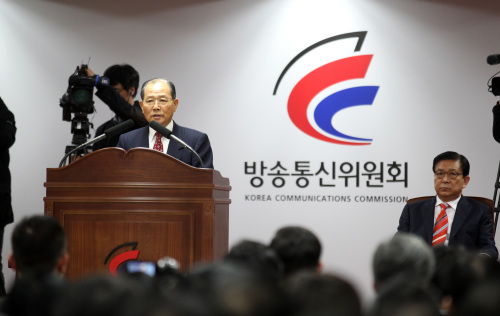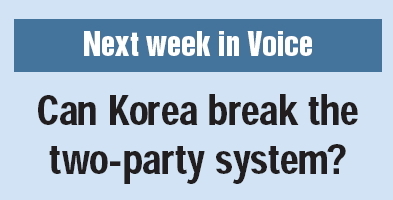After being sent a revised list of questions, KCSC spokesman Han Tae-seon defended the body’s role in safeguarding against harmful content, denying that it impinges upon freedom of expression.
“Although people are free to express themselves, they should not use profanities or distort the truth because this may harm public discourse,” Han said.
“Freedom of expression is a constitutional right and so it is not a question of ‘striking a balance.’ Nothing we review or restrict is to violate the right to freedom of expression.”
Han added that the KCSC does not censor content, but merely makes requests of websites and Internet providers, some of which are not followed. As evidence of this, he pointed to a 2008 KCSC request, put to him by The Korea Herald, that a website “purify language and refrain from exaggerated expressions” over a message calling President Lee “2MB” and a “sly person.” “2MB” refers to President Lee’s initials, but can also be interpreted as a derogatory reference to his intelligence.
“We sent a request to the caf manager and it was up to him to decide how they would respond, but as far we know after we checked the posting again little had been changed,” Han said.
He said that particular request had been made on the grounds of “other necessary measures,” as provided by the law governing Internet content.
Furthermore, the KCSC, he said, is highly transparent in its decision making.
“The review process is available on our homepage, and members of the public can sit in on our deliberations except in cases of defamation,” Han said.
But critics such as Oh Byoungil, a staff coordinator at Jinbonet, a left-leaning organization for Internet freedom, question the need for a body that has been “misused by the powerful to suppress criticism,” including negative postings about former Seoul Mayor Oh Se-hoon and other pro-government figures.
Rather, the Jinbonet coordinator believes that the Internet community should be allowed to regulate itself.
“I don’t think we need an administrative body to regulate the internet. Are there any other countries in which the administrative body can regulate the internet? Self-regulation by the Internet community or ISP can be one solution to regulate the content harmful to minors. If the content is illegal, it can be regulated by the court. However, the KCSC has regulated even content which is not illegal, and it’s not a competent body to decide illegality of the content,” he said.
The removal and blocking of content is not the only threat to Internet freedom, say activists. The real-name system, which forces online users to supply their name and Resident Registration Number when posting on websites with more than 100,000 daily visitors, has been controversial since its introduction in 2007. The rule came in for renewed criticism last year after the personal details of 35 million Cyworld users were stolen by hackers last July. In December, the KCC announced it would phase out the system by 2014.
Critics also complain of political bias when it comes to what is restricted and why.
“It is not just the KCSC, but all administrative entities are charged with the direct or indirect mandate of upholding the policy goals of the democratically elected head of the state,” said Park, who is also a lawyer.
“However, such a mandate, if applied to the free speech area, is deemed unconstitutional. Korea relies heavily upon administrative bodies whose role has been challenged as politically and culturally biased. Administrative bodies should stay out of areas concerning freedom of speech.”
Han rejects any suggestion that the KCSC is open to political bias or manipulation.
“(The law) states that the commission should not be influenced by outside interference or special favors. By following this law we are following our political neutrality.”
By John Power (
john.power@heraldcorp.com)
Readers’ voice
On Internet freedom...
Definitely not, (Korea does not really have Internet freedom), and it can be proved in one simple example: Try to access the North Korean government website and you will be met by the great, blue firewall of the Korean Communication Standards Commission. No matter what justification is given for this, this is textbook Internet censorship.
― Brain Arundel, Seoul, via Facebook
Before I start, I would like to define Internet freedom. Internet freedom is not being able to access every document in this world. Obviously, you cannot get CIA information or classified North Korean documents without hacking(which would be violating the law). I would like to define freedom on the Internet as being able to express oneself freely without any interruption from others and still following the law. When it comes to expressing oneself freely on the Internet, Korea has the best opportunities. You can go to every website without checking your identity (Once again, unless the materials are classified or restricted to those who are under 18). South Korea, unlike the North, allows anyone with Internet access onto the Internet.
The government does not shut down the Internet to cut off information to its people, like the Libyan government did during the riots. Some people might say that the government trying to block rumors about politicians being posted on Twitter and Facebook invades freedom of speech and freedom to use the Internet. However, these rumors are violations of the law. They harm politicians’ reputations, bringing them losses in polls and such.
Giving false information to others might be considered fraud, eventually leading to turmoil. From this point of view, these rumors must be restricted and ought be controlled by the government for security and peace. Considering all the facts above, Korea actually guarantees Internet freedom and guess what? We love it and cannot live without it.
― Yuh Yun-sung, Daegu, via Facebook
Yes (Korea clamps down too much on the Internet). I can’t even have a Naver dictionary account without providing detailed info for self identification.
― Michelle Lee Jones, Seoul, via Facebook
On N.K. refugees in China...
A man would have to weed a field of 350 pyeong (1,000 square meters) for a day after eating a bowl of rice with corn-mixed soy brine in the morning. He couldn’t sleep because management of the labor camp wouldn’t let him if he didn’t memorize “10 principles” and was kept under guard from going to the restroom, living in groups of three.
Another eyewitness said, “I was dragged to the prison at an altitude of 1,500 meters and there saw an oxcart transfer several corpses under a banner saying “escape is self-destruction, lets not eject ourselves”
I am not describing a scene from a horror movie. It is reality. Our northern brothers undergo a wretched life right now in North Korea.
The National Human Rights Commission unveiled some cases heard from N.K. defectors a few weeks ago.
Civic groups and political groups have held rallies to oppose repatriation day after day, picketing with signs, “SAVE my friend,” “Do not repatriate.”
Of these rallies, about 400 women university students held a rally in front of the Chinese Embassy in Seoul. Also, a candidate of the Saenuri party in Ulsan, in Gyeongsang Province, staged a one-man protest.
Moreover, celebrities gave a concert to elevate the voices against repatriation and to give hope to North Korean refuges in South Korea through the “cry with us” concert.
In spite of this appeal to China, the Chinese government keeps on repatriating North Korean refuges in China, cornering them into a deadly situation. According to the U.N. Refugee Agreement, which China joined in 1982, countries cannot repatriate refugees to a nation where they face oppression.
― So Kyung-suu, Seoul









